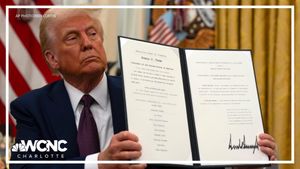Elon Musk's grip on various government agencies is raising significant concerns over cybersecurity and oversight, following his controversial influence over organizations such as the Office of Personnel Management (OPM) and the General Services Administration (GSA). The situation escalated with the resignation of David A. Lebryk, the former acting U.S. Treasury Secretary, who reportedly clashed with Musk's aides over access to sensitive payment systems.
According to The Washington Post, Lebryk's departure marks the dismissal of one of the highest-ranking career officials at the Treasury Department. The clash centered around requests from Musk's team to gain access to the Treasury payment systems, which are pivotal for processing nearly 1.3 billion payments amounting to about $5.4 trillion annually.
Former Treasury officials were taken aback by the lack of clarity surrounding the nature of Musk's access requests. Sources revealed Musk's allies have been pushing for this access since well before his inauguration, and after he assumed control of the OPM upon President Trump’s inauguration on January 20, 2025.
"It feels like a hostile takeover," remarked one OPM employee, expressing the anxiety swirling within the agency as Musk's team quickly installed representatives from his companies, including Tesla and SpaceX, to key positions. This internal restructuring is part of Musk’s broader strategy known as the Department of Government Efficiency, aimed at streamlining federal operations by slashing workforce size and reversing ostensibly excessive spending.
Officials from OPM revealed alarming incidents of career civil servants being locked out of the computer systems containing sensitive personal data of millions of federal employees—a move many deem as exacerbated cybersecurity risks due to the potential unvetted status of Musk's team. "We have no visibility... It creates real cybersecurity and hacking implications," stated one of the officials mildly disclosing the fears of retaliation.
Musk's appointed aides are remapping the operational strategies at these agencies with unprecedented autonomy, including revamping the data channels and redefining organizational priorities. For example, they have already set their sight on cutting down 50% of operational costs associated with GSA-managed services.
Meanwhile, the internal atmosphere at GSA has shifted dramatically, with existing employees reporting dissatisfaction and apprehension about their futures under Musk’s influence. Nicole Hollander, who played unofficial roles during Musk's previous company transitions, is among the new appointees wielding significant authority within the GSA. Hollander, along with other ex-Musk employees, is deploying tools and directives reminiscent of corporate management styles rather than traditional government operations.
Recent communications sent to over two million federal employees by OPM encouraged opting for "deferred resignations," insinuated promises of compensation during the transition period, mirroring Musk's own notes during the Twitter acquisition. The memos collected ire among seasoned civil servants who expressed doubts about the realities of such promises, which reflected Musk’s notorious previous labor practices with staff cutbacks and severance disputes.
Stephen Ehikian, the acting administrator of GSA, confirmed the legitimacy of the resignation offers during subsequent communications, emphasizing the approach as part of broader institutional changes aimed at resetting the bureaucracy. "Yes, the OPM email is real and should be taken very seriously," he remarked, trying to clarify any misunderstandings about the tone of the internal communications bearing Musk’s mark.
The encroachment of Musk’s team emphasizes alarming possibilities of unregulated access to sensitive federal data. A former Biden administration official warned, "Granting DOGE staff... poses a huge security risk to the federal government and to the American public. Not only will DOGE be able to review procurement sensitive information about major government contracts, it'll also be able to actively surveil government employees."
This crisis of confidence within federal agencies is echoed by academic voices, including Don Moynihan from the Ford School of Public Policy, who questioned the overarching narrative of efficiency and effectiveness propagated by Musk's administration. "This makes it much harder for anyone outside Musk's inner circle at OPM to know what's going on," he said, amplifying the call for much-needed congressional oversight.
While the administration touts efficiency and modernization of aging structures, the lack of transparency poses tangible risks to the security of sensitive data. Given the scale at which Musk has initiated changes within the federal sector and the associated controversies, the immediate future of government employee relations and performance under Musk's unusually swift governance continues to hang precariously.
Federal employees and watchdog groups alike are watching closely as the new standard of governance emerges under the Musk-led paradigm—one fraught with violations of established protocols and unmitigated uncertainties surrounding oversight and cybersecurity. How this plays out not only affects the immediate staff at OPM, GSA, and Treasury, but sets far-reaching precedents for federal operations and their future stewardship.



